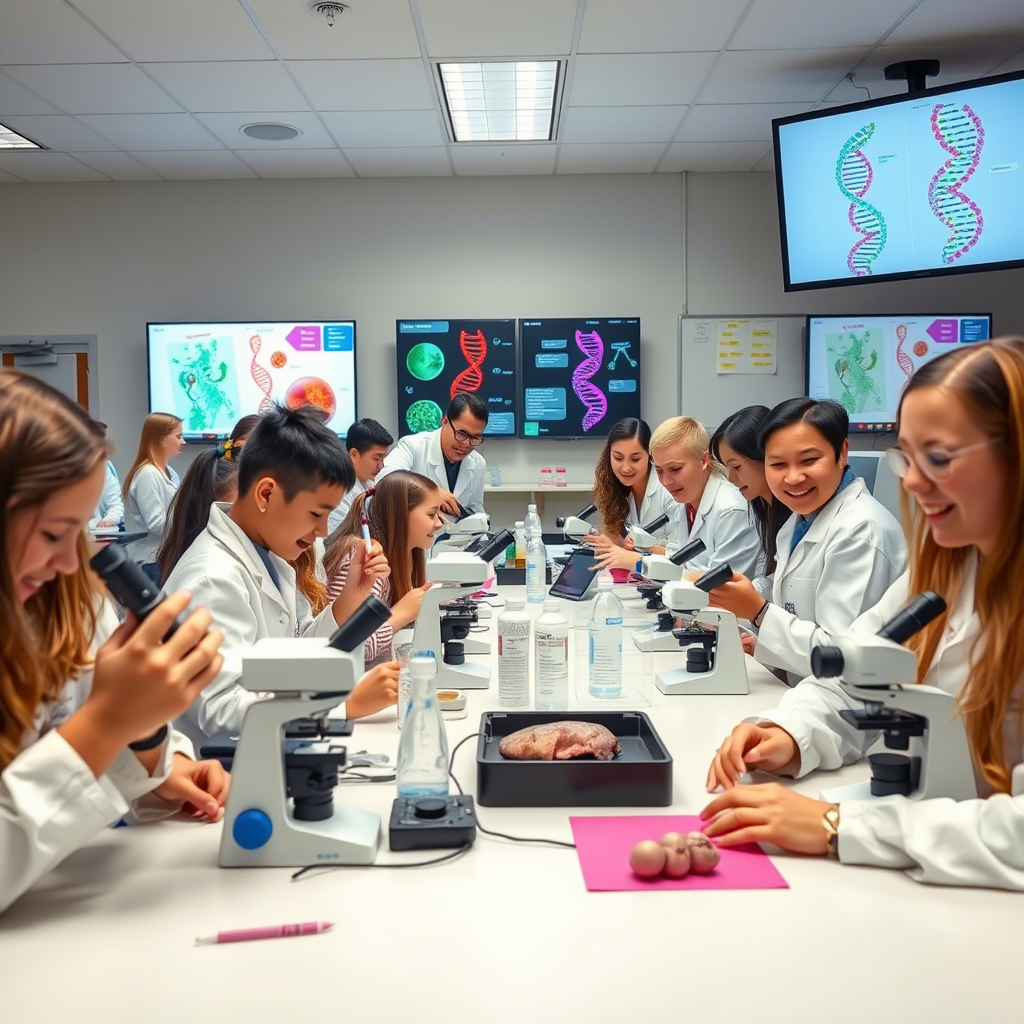AP Biology course – Explanation and Questions- is one of the most challenging yet rewarding Advanced Placement courses offered by the College Board. Covering everything from molecular genetics to ecology, AP Bio requires critical thinking, detailed understanding, and strong analytical skills. Whether you’re aiming for a 5 or just trying to pass the exam, this guide breaks down the essential content, study strategies, and includes practice questions to sharpen your skills.
AP Biology course Key Topics
AP Biology unit 1 main topics
The Structure and Properties of Water
Macromolecules: Structure and Function
Enzymes and Biochemical Reactions
Unit 1 AP Biology Questions
AP Biology Unit 2 main topics
- Cell Structure
- Cell Structure and Function
- Cell Size
- Plasma Membranes
- Membrane Permeability
- Membrane Transport
- Facilitated Diffusion
- Tonicity and Osmoregulation
- Mechanisms of Transport
- Cell Compartmentalization
- Origins of Cell Compartmentalization
Unit 2 AP Biology Questions
AP Biology unit 3 main topics
- Enzyme Structure
- Enzyme Catalysis
- Environmental Impacts on Enzyme Function
- Cellular Energy
- Photosynthesis
- Cellular Respiration
- Energy & Fitness
Unit 3 AP Biology Questions
AP Biology unit 4 Main topics
Cell Communication AP Biology
Introduction to Signal Transduction AP Biology
Signal Transduction
Changes in Signal Transduction Pathways
Homeostasis & Feedback Loops
Cell Cycle
Regulation of the Cell Cycle
Unit 4 AP Biology Questions
AP Biology unit 5 AP main topics
Environmental Effects on Phenotype
Unit 5 AP Biology Questions
AP Biology Unit 6 main topics
DNA and RNA Structure
Replication
Transcription and RNA Processing
Translation
Regulation of Gene Expression1
Gene Expression and Cell Specialization
Mutations
Biotechnology
Unit 6 AP Biology Questions
AP Biology Unit 7 main topics
- Introduction to Natural Selection
- Natural Selection
- Artificial Selection
- Population Genetics
- Hardy-Weinberg Equilibrium
- Evidence of Evolution details
- Common Ancestry
- Continuing Evolution
- Phylogeny
- Speciation
- Extinction
- Variations in Populations
- Origin of Life on Earth
Unit 7 AP Biology Questions
AP Biology Unit 8 main topics
- Responses to the Environment
- Energy Flow Through Ecosystems
- Population Ecology
- Effect of Density of Populations
- Community Ecology
- Biodiversity
- Disruptions to Ecosystems
Unit 8 Questions
General Questions about AP Biology
The AP Biology exam consists of two sections:
- Multiple-Choice Section : 60 questions focusing on scientific practices and content knowledge.
- Free-Response Section : 6 questions requiring detailed explanations and problem-solving skills.
Students who score well on the AP Biology exam can earn college credit or advanced placement, giving them a head start in their academic journey.
What is AP Biology?
AP Biology is a college-level course that explores fundamental biological principles and processes. It is designed to be the equivalent of a two-semester introductory biology course for biology majors.
Course Themes:
- Evolution – Drives the diversity and unity of life
- Cellular Processes – Energy and communication
- Genetics and Information Transfer
- Interactions – Between systems, organisms, and the environment
Key Units Covered in AP Biology:
- Chemistry of Life
- Cell Structure and Function
- Cellular Energetics
- Cell Communication and Cell Cycle
- Heredity
- Gene Expression and Regulation
- Natural Selection
- Ecology
Each unit is linked to specific learning objectives and science practices, such as data analysis and lab investigations.
Study Tips for AP Biology Success:
- Master the Big Ideas – Understand concepts over memorizing facts.
- Use Visuals – Diagrams and concept maps help reinforce content.
- Practice FRQs (Free-Response Questions) – Train yourself to think like an AP grader.
- Take Full-Length Practice Tests – Simulate test day conditions.
AP Biology FAQs (Frequently Asked Questions)
1. What is AP Biology?
Answer:
AP Biology is an Advanced Placement course and exam offered by the College Board. It’s equivalent to a two-semester college-level introductory biology class and covers a wide range of topics like evolution, cellular processes, genetics, and ecology.
2. How hard is AP Biology?
Answer:
AP Biology is considered one of the more challenging AP science courses due to its depth of content and analytical thinking requirements. However, with strong study habits and consistent review, students can succeed and even score a 5.
3. What are the prerequisites for AP Biology?
Answer:
Most schools recommend or require completion of high school biology and chemistry before taking AP Biology. A good foundation in these subjects helps with understanding complex processes.
4. How is the AP Biology exam structured?
Answer:
The exam consists of:
- Section I: Multiple Choice – 60 questions, 90 minutes, 50% of score
- Section II: Free Response – 6 questions (2 long, 4 short), 90 minutes, 50% of score
5. What topics are most important in AP Biology?
Answer:
Key topics include:
- Evolution
- Genetics and gene expression
- Cellular respiration and photosynthesis
- Cell communication
- Ecology and biological interactions
6. How can I get a 5 on the AP Biology exam?
Answer:
To score a 5:
- Master core concepts, not just facts
- Practice FRQs regularly
- Take timed practice exams
- Use prep books, flashcards, and online resources
- Review released exams and scoring guidelines
7. Are there any good online resources for AP Biology?
Answer:
Yes! Some great ones include:
- AP Classroom (College Board)
- Khan Academy (AP Bio Course)
- Bozeman Science (Videos)
- Fiveable & Albert.io (Practice & Strategy)
8. Is AP Biology worth taking?
Answer:
Definitely—if you’re interested in biology or a future in health, science, or medicine. It can earn you college credit, boost your GPA, and demonstrate academic rigor on college applications.
9. What labs are required in AP Biology?
Answer:
AP Biology includes 13 recommended labs, such as:
- Osmosis and diffusion
- Photosynthesis
- Cellular respiration
- DNA transformation
- Animal behavior You don’t need to memorize each procedure, but you should understand the concepts and data analysis involved.
10. Can I self-study for AP Biology?
Answer:
Yes, but it requires discipline. Use a good prep book, follow a schedule, and practice both MCQs and FRQs. Online videos and lab simulations can help fill gaps where in-class experiments are missed.
Find us on Facebook


